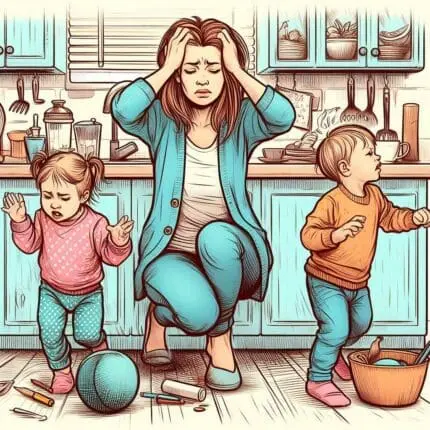We all know that there’s no such thing as a “perfect” parent, but even so, many parents hold themselves to unreasonably high standards. Our work as therapists includes helping our clients genuinely accept their imperfections, work through shame, and repair and reconnect with their loved ones. In the process, they model what it means to take responsibility, and strengthen their relationships. Recently, I helped my client Tiffany let go of her own self-imposed requirement to be a perfect parent—and thanks to a little self-disclosure, she not only felt less alone in her “failure,” but was able to take steps toward repairing her relationships with her partner and children.
Two months ago Tiffany called to schedule an emergency session. Earlier that morning, she and her husband, Zach, had a bad argument that left her feeling hurt, angry, and guilty.
“I don’t like arguing in front of the children,” she told me. “And usually we manage to keep things under wraps until we can be in private. But this morning, I couldn’t stop myself. Zach was griping about the children not getting ready fast enough, but he wasn’t doing anything at all to help! And they were being awful, just lying in bed demanding video time before school.”
Tiffany’s voice trembled, and for a moment she was quiet as she fought to hold back tears.
“I yelled at them all,” she blurted out. “I shouted, ‘I can’t stand this!’ and told Zach I was going to work and that he could deal with getting the kids ready. But before I could walk out of the house, my littlest one tried to hug me. I told her I couldn’t, and left.”
Tiffany began sobbing. “I’m mad at Zach and feeling miserable about my marriage, but even worse, I feel terrible about what I did to my children. What kind of mother yells at her kids and walks out on them?”
She took a breath. “I know what kind of mother. Mine. It’s something my mom used to do and something I swore I’d never do to my own children. I’ve worked so hard to make sure I don’t repeat her mistakes, and here I am, doing the exact same thing! I should’ve stopped and explained that I was upset but that I still loved them. They were just being kids. I keep thinking back to their sad little faces. It breaks my heart. I want to go to their schools to make sure they’re okay. But maybe that would just make things worse.”
Like many parents these days, Tiffany was well-attuned to her children’s emotional and attachment needs. She knew that the idea of a “perfect parent” was a myth, and she generally felt like a pretty good mom. Still, she didn’t like making mothering mistakes, and she felt that this one was pretty awful.
I tried to help Tiffany accept this misstep by reassuring her that we all make mistakes with our kids, but she continued to berate herself. But as she did, I began thinking back to some of the many times I’d messed up with my own child, who’s now a grown man with a family of his own. I used to joke that I would make a list of all the terrible parenting errors I’d made so that he could save time when he started his own therapy, as he would inevitably do. It would’ve been a long list, but as I’ve learned in my own life and in my therapy practice, most of the time, what parents feel bad about isn’t even on their child’s mind.
Thinking about Tiffany’s situation triggered a particular memory for me: that the worst thing I’d done to my family wasn’t as a mother, but as a grandmother. A few years earlier, my husband and I had been staying at an Airbnb while visiting my son and his family out of state. Our three-year-old grandson had been staying with us, and we’d just finished making breakfast together. I hadn’t been paying attention to how close he was to the stove, standing on a stool, and even though the burners had been turned off, they were still hot. When he’d turned to show me something, he accidentally put his hand on the stove, and started screaming.
Immediately, I made a mistake: I put Neosporin on the burn. Then I called his mom, who told me to run his hand under cold water and said she’d be right there. She called her pediatrician on the drive home, who told her to take him to the emergency room. At least outwardly, she was calm and efficient—a seemingly perfect mom in a difficult situation. I knew she probably wasn’t feeling calm or efficient, but still, she soothed her son, took care of his physical and emotional needs, and managed to soothe me as well. “Mistakes happen,” she told me. “You’re a great grandma. This could’ve happened to any of us.”
“As a daughter, a mother, and a therapist, I know all relationships are imperfect,” wrote my friend and colleague Judith Ruskay Rabinor. “Most of us have done things we regret, and often, don’t even understand.” These behaviors may be emotionally loaded, or they may simply be accidents. But, she continues, “none of us are as bad as the worst thing we have ever done.”
One of the most important things for parents to keep in mind is that most failures can be addressed directly with our children. Psychoanalyst Heinz Kohut once pointed out that repairing these ruptures can be more important than the mistake itself. Taking responsibility for our error, recognizing and validating our children’s feelings, and expressing genuine remorse for causing them pain helps our children in a variety of ways.
Recognizing and validating their emotions when they’re upset with us helps them develop self-awareness and emotional intelligence. It also models empathy and compassion. Owning what we’ve done provides them with an in vivo example of taking responsibility for your behavior. And acknowledging our imperfections without demanding forgiveness or acting as though we’ve lost sight of our strengths shows our children how to accept, take responsibility for, and learn from their own failures.
One of the most important components of this process is its interactive quality. Taking responsibility isn’t enough. Acknowledging a child’s feelings is important, but not enough. The real goal is to repair the relationship without ignoring the impact of the offense.
I wasn’t sure whether it would be helpful for Tiffany to share my memory with her. But then, she suddenly asked me, “Did you ever do anything like this to your children?”
I laughed. “Oh, I was just thinking about that,” I said. Then I told her about the experience with my grandson.
Tiffany began to wipe away her tears. “Wow. I always thought of you as being so perfect,” she said. “Well I guess it’s good to know that you’re not perfect, after all. But it sounds like your daughter-in-law might be. I’m not sure I could have forgiven you after something like that.”
I nodded. “I’m not sure I could have forgiven my own mother for that, either,” I said. “I’m lucky. She’s a very generous woman. But maybe you and I might have eventually been able to repair the rift with our mothers if it happened with them. We both know that nobody’s perfect, and we’ve both made mistakes with our own children.”
For a minute, Tiffany was silent. “I guess the trick is also to be able to forgive yourself,” she finally said. I nodded.
In our next session, Tiffany told me that she’d spoken to her husband and apologized to him. “I told him I want to work on the ways we fight,” she said. “We’re not going to stop arguing, because we aren’t going to stop having differences of opinion. But maybe we can talk about how to disagree more effectively and less hurtfully.” Her husband had agreed.
“Then I asked him for advice about how to handle the incident with the girls,” she continued. “He said they’d probably already forgotten it, but that if I wanted to say something, maybe the best thing was to just be straightforward about it, to tell them I didn’t like what I’d done, that Daddy and I were going to work on how we talk to each other, and that I wanted to work with them on how we talk to each other, too.”
Tiffany told me she’d felt soothed and understood by her husband. Later that night, after dinner, she spoke to her children as he’d suggested, but first she’d asked them how they were feeling about what had happened. “It’s funny,” she said. “My older daughter said, ‘It’s just the way you and Daddy are.’ My younger daughter didn’t remember any of it.”
Tiffany wondered if she should try to make her little one remember. “Did she just suppress her feelings?” she asked me.
I told her that small children often let us know when something is wrong, although not always directly. Over the next few days, she could watch to see if there were signs that her daughter was upset, but if she seemed like her usual self, she’d probably just accepted that this was part of her parents’ relationship.
“So I guess the most important thing is to move on and work hard at changing those behaviors,” she said.
“And to recognize that none of us is perfect,” I added. She smiled.
“So did your son and daughter-in-law ever let you take care of your grandson again?” she asked.
“They did,” I replied. “As soon as he came back from the emergency room, he showed me his Band-Aids, covered in cartoon designs. Then my son asked him if he wanted to stay with me, and he said yes without missing a beat. I asked if they were sure they were comfortable with that, and they also said yes, and went back to work.”
It’s important not to put our children in charge of alleviating our guilt or make them responsible for letting us off the hook. When Tiffany finally spoke to her children that evening, she told them that what she’d done was wrong. She didn’t put the blame on her husband or on them, nor did she make excuses for herself. Even though her children didn’t seem to think it was a big deal, she told them she’d been upset and that she didn’t like herself or her actions in that moment.
Her children’s responses surprised her. They smiled, her older daughter patted her head, and her younger daughter asked if they could watch their favorite show. Although Tiffany worried that they needed to talk more about what had happened, their mild reactions reinforced my sense that she and her husband were doing a good job as parents. Her conversation with her husband had been more difficult, but also indicated the solidity of their relationship. After she’d apologized, he’d defended his behavior, but when she continued to take responsibility for what she’d done and reminded him that they were both working very hard, feeling overwhelmed, and needed to work together on managing their conflicts better, he’d agreed.
That agreement wasn’t the last of their arguing, nor was it the end of difficulties between them in the mornings, when getting the kids out the door for school was often a challenge. It also wasn’t the last parenting mistake either of them would make. But it was a turning point, an opportunity for both of them to experience what they were trying to teach their children: mistakes happen, and nobody’s perfect. They could care about each other and stay connected, not just in light of these mistakes, but because of the work they’d done to repair them.
F. Diane Barth
F. Diane Barth, LCSW, is a psychotherapist, teacher, and author. She’s written about women’s friendships, aging, and integrative psychotherapy. She blogs for Psychology Today and on Substack.







